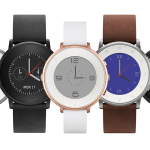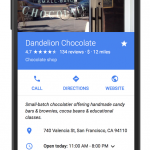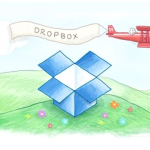Privacy blow as FCC says websites can ignore Do Not Track requests

People are more concerned than ever before about online privacy, and this is the very reason Consumer Watchdog filed a petition to force websites to honor Do Not Track Requests. The Federal Communications Commission handed down a ruling which is not going to please privacy advocates.
In short, the FCC has said that websites should be under no obligation to take notice of Do Not Track requests. The commission dismissed Consumer Watchdog's petition that called for 'edge providers' -- such as Google, Facebook, YouTube, Pandora, Netflix, and LinkedIn -- to respect people's privacy if they enabled the Do Not Track option in their web browser.
Experts warn that placing your router near a lamp slows down internet speeds

Few people would argue against the idea that router placement -- particularly when it comes to maximizing Wi-Fi footprint -- is important. But it is not just the location that's key; broadband speeds could also be affected by seemingly innocuous objects in the home.
The head of the UK's communications regulator Ofcom warns that numerous electrical goods in the home can interfere with signals and slow down the internet. It's a problem that affects around 20 percent of households, and while there are some obvious culprits on the list of web-killers such as stereos and baby monitors, there are also some surprises.
Fast broadband to be classed a 'fundamental right'

Every home and business in the UK will have access to "fast broadband" by 2020. This is the latest pledge from Prime Minister David Cameron, who said that access to the internet "should be a right".
At the moment, 83 percent of people have access to superfast (24Mbps and faster) internet connections, and by 2017 this is expected to rise to 95 percent. The latest plan is directed at the "last 5 percent" -- such as people in remote areas -- and will oblige broadband providers to supply at least 10Mbps broadband to anyone who demands it.
Major tech companies don't care much about your privacy
HTC One A9 is the iPhone 6s for Android

Without even turning on the HTC One A9 (which I haven't yet), the physical similarities with iPhone 6/6s are unmistakable. The smartphones share striking design ethic, separated by the shape of the home-button fingerprint sensor, placement of the rear-facing camera, and left-side SIM and microSD card slots. But these differences aren't immediately obvious.
My question: Is this the Android for people wanting the iPhone 6s look but something more flexible than the iOS platform? If there is truth in marketing, HTC's tag lines reveal much: "Design worth imitating", which while referring the company's One legacy also could be interpreted as backhanded praise or even fist-to-snub about Apple's device, which some could argue imitates earlier One models. "Power to choose"—customization and personalization options not offered on fruit-logo handsets.
People care more about hacker attacks than break-ins

People feel more violated when someone hacks into their computer, than when someone breaks into their house, a new research has shown.
The research, done by American multinational software Citrix, polled 2,000 full-time workers in the UK about hacking and private files they keep on their computers. The poll shows that 48 percent of young people, aged 16 to 24 have more than one private file on their computers which they want to remain secret.
Pebble doesn't see Apple Watch as a threat -- sales double year-over-year

Pebble, one of the first tech firms that jumped into the smartwatch foray via a Kickstarter campaign, has been unaffected by the competition brought by the Apple Watch, says the company CEO Eric Migicovsky.
Migicovsky revealed that the company’s sales has improved, which experienced a double year-over-year growth. Apple Watch had "no material impact" on the company, Migicovsky claimed, adding that this is due to the difference in the market the companies tap.
Christmas is coming -- Google Maps and Search get holiday hours

I hate leaving the house. Don't get me wrong, I love nature and fresh air, but my fellow humans can be sort of annoying. A trip to Walmart, or a mall, can be the most soul-crushing experience -- fewer people have manners nowadays. In other words, many shoppers do not know how to properly behave in public. This is why I try and do all my shopping online.
If you are a glutton for punishment, maybe you enjoy shopping in brick and mortar stores. With Christmas -- and other holidays -- approaching, many stores will have special hours, both shortened and extended. Now Google is making it easier to see these special holiday hours.
How many users are actually paying for Dropbox?

Stat attack: Dropbox has more than 400 million users worldwide. Out of that number, some 8 million are business users.
From those 8 million, there are more than 150,000 paying ones. Those are the numbers given by the company’s chief executive officer Drew Houston, during the Dropbox Open conference, held in San Francisco yesterday.
ProtonMail sets a dangerous precedent and opens itself up to further attacks by paying ransom

In the world of malware, one of the most recent trends is ransomware -- malicious software that either blocks access to a computer until a fee is paid, or files are encrypted until a ransom is put forward. As with ransomware and kidnapping, a ransom is often demanded by hackers and instigators of DDoS attacks.
This is precisely what happened to 'secure' email provider ProtonMail the other day when it found its datacenter inundated with traffic. At the time, the company asked for donations to cover the costs of the "quite expensive solutions" needed to fight back against "the sophistication of this attack". But rather than fighting back, ProtonMail decided to pay the ransom instead. This could prove to be a terrible mistake.
Samsung takes on Roomba with its own robotic vacuum

Don't feel like cleaning? That's where robotics take over. The "creatures", like home automation, are a growing segment of today's tech market. After all, who wants to vacuum or get up to turn lights on or off? Yes, we're an increasingly lazy species.
Samsung is rolling out, so to speak, an automated vacuum cleaner to rival the long-standing king, Roomba. The company wanted to push the product out in time for the holiday shopping season, stating that customers need to get ready for, and clean up after, the parties. It states that "In fact, a recent survey found that almost one-third of consumers said they stress about cleaning the floors and rugs when they think about holiday entertaining".
Marshmallow running on 0.3 percent of Android devices

Since a new version of Android is initially available only on a handful of devices, most of which feature a Nexus logo on the back, you can expect its market share to be extremely low in the first few months following its release. Lollipop, for instance, needed over two months to break past the 0.1 percent barrier -- and we are only talking about Android land here.
The latest version of Android, however, is already proving to be way more successful. In just a month, Marshmallow has reached 0.3 percent of Android devices. This adoption figure comes from Google's Android distribution share chart, which was just updated with data collected in the seven days ending November 2.
My OS X El Capitan and Windows 10 upgrade woes

What’s the next step after an operating system upgrade on a Mac or PC? To see if you can work with your existing applications. When moving to OS X El Capitan and Windows 10 I got off to a rough start, which left me frustrated.
Let’s address the El Capitan problems first. Did the upgrade install? Yes! Was I able to work? Nope.
Best Windows apps this week

One-hundred and fifty-three in a series. Welcome to this week's overview of the best apps and games released for Windows 8.x/10 in the past seven days.
This week saw a surprisingly large number of applications and only a handful of games worth mentioning. If you followed the Best Windows Apps of the Week series you know that this is not often the case as games tend to dominate the Windows Store.
Location is key to app experiences but users are reluctant to share it

According to a new survey 83 percent of app users say location is crucial to their app experiences, but nearly 40 percent are hesitant to share their location.
These are part of the findings of a study by Skyhook Wireless which looks at the extent to which people turn location services on or off for their apps and tries to understand why many smartphone users choose not to take advantage of the benefits sharing location can bring.
Most Commented Stories
© 1998-2024 BetaNews, Inc. All Rights Reserved. Privacy Policy - Cookie Policy.





